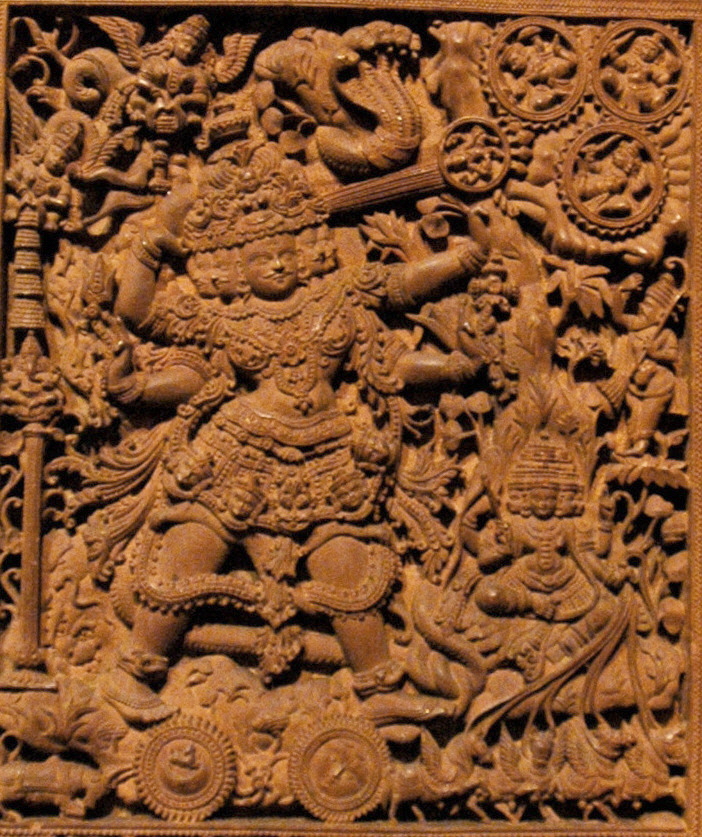నిప్పై పాతకతూలశైల మడచున్ నీనామమున్ మానవుల్
nippai pātakatūlaśaila maḍacun nīnāmamun mānavul
Nippai PaatakaToolaShaila Madachun Nee Naamun Maanavul
తప్పన్ దవ్వుల విన్న నన్తక భుజాదర్పోద్ధతక్లేశముల్
tappan davvula vinna nantaka bhujādarpoddhatakleśamul
Tappan Davvula Vinna Nantaka BhujaaDarpodDhataKleshamul
తప్పున్దారును ముక్తు లౌదు రని శాస్త్రమ్బుల్మహాపణ్డితుల్
tappundārunu muktu laudurani śāstrambulmahāpaṇḍitul
Tappun Daarunu Muktulaoudurani Shaastrambul Maha Panditul
చెప్పఙ్గా దమకిఙ్క శఙ్క వలెనా శ్రీ కాళహస్తీశ్వరా! || ౧౦ ||
ceppaṅgā damakiṅka śaṅka valenā śrī kāḷahastīśvarā! || 10 ||
Cheppanga Damakina Sankha Valena Sri Kalahastiwara!!
- నిప్పై : To flare up or to ignite
- పాతకతూలశైల: పాతక+ తూల+ శైల; పాతక=A grave sin or మహాపాపము; తూల=దూది=Cotton; శైల=కొండ=Mountain. Here it's referred to as a frail mountain of grave sins.
- మడచు : Destroy
- దవ్వుల : Distant or far away
- విన్న : To hear or be audible
- నంతక భుజాదర్పోద్ధతక్లేశముల్ : అంతక+భుజా+దర్పోద్ధతి+క్లేశములు : అంతక = Lord Yama; భుజా = Shoulders or here strong arms; దర్పోద్ధతి = Boldness or audacity; క్లేశములు: Distress or Suffering. Here it's referred to as distress and pain one endures during the time of death
- ముక్తులు : Here it's బంధ విమోచనం; Liberation or Emancipation
- శాస్త్రం : Precept, Axiom, Dogma or Doctrines
- మహా పణ్డితుల్: Great Scholars and Literati.
- దమకిఙ్క: తమకి+ ఇంకా; తమకి = Yourself here, an appellation of the Lord; ఇంకా = Further more
- శంక : Doubt or Suspicion.
- వలెనా : Ought to, Here questioning if there is there any need for concern.
Our inequities
piled up as mounds
of cotton, get flared up by
Your name, when heard from
a distance, despoils our atrocities
liberating us from distress of death, duly
heard from the doctrines and erudite should
You to be concerned, Sri Kalahastiswara!!
The poet, in conversation with Hara, the one who dissolves all bondages and sins, affectionately assures the Lord that, the scholars and erudite have already evangelized the immense power His name bears, thereby pleading the Lord not to hesitate any more and come to the rescue.
The sins that we continue to accrue in our mortal life are compared to an inflammable mountain of cotton (పాతకతూలశైలం), which can easily be destroyed by chanting the the name of Lord who appears in the form of Agnijwalaaya, for He has fire as His energy, strength and vitality.
Just by hearing the name of Mrityunjaya, (the conqueror of death) from a distance, one is liberated from the fear, pain and distress caused by Yama Paasam (referred as అంతకభుజాదర్పోద్ధతిక్లేశములు), the dreaded noose pulled by the powerful shoulders of Lord Yama, at the time of death.
This is great opportunity to remember the Maha Mrityunjaya Mantra and chant the name of Kalakalaya, for He is the death of death:
ॐ त्र्यम्बकं यजामहे
ఓం ! త్రయంబకం యజామహే
Om Tryambakam Yajaamahe
सुगन्धिं पुष्टिवर्धनम्
సుగంధిమ్ పుష్టి – వర్ధనం
Sugandhim Pushtivardhanam
उर्वारुकमिव बन्धनान्
ఊర్వరుకమివా బంధనన్
Urvaarukamiva Bandhaaan
मृत्योर्मुक्षीय मामृतात् ॥
మృత్యోర్ ముక్షియ మమృతత్
MrityorMokshiya Maamrutaat
నిప్పై పాతకతూలశైల మడచున్ నీనామమున్ మానవుల్
తప్పన్ దవ్వుల విన్న నంతక భుజాదర్పోద్ధతక్లేశముల్
తప్పుందారును ముక్తు లౌదు రని శాస్త్రంబుల్మహాపండితుల్
చెప్పంగా దమకింక శంక వలెనా శ్రీ కాళహస్తీశ్వరా! || 10 ||
తప్పన్ దవ్వుల విన్న నంతక భుజాదర్పోద్ధతక్లేశముల్
తప్పుందారును ముక్తు లౌదు రని శాస్త్రంబుల్మహాపండితుల్
చెప్పంగా దమకింక శంక వలెనా శ్రీ కాళహస్తీశ్వరా! || 10 ||
nippai pātakatūlaśaila maḍacun nīnāmamun mānavul
tappan davvula vinna nantaka bhujādarpoddhatakleśamul
tappundārunu muktu laudu rani śāstrambulmahāpaṇḍitul
ceppaṅgā damakiṅka śaṅka valenā śrī kāḷahastīśvarā! || 10 ||
tappan davvula vinna nantaka bhujādarpoddhatakleśamul
tappundārunu muktu laudu rani śāstrambulmahāpaṇḍitul
ceppaṅgā damakiṅka śaṅka valenā śrī kāḷahastīśvarā! || 10 ||














